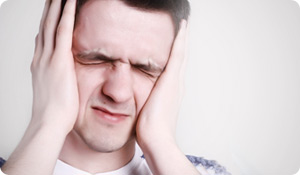
Roughly 25 million Americans have experienced tinnitus, according to the National Institute on Deafness and Other Communication Disorders. Tinnitus, a noise or ringing in the ears, is not a condition itself, but a symptom associated with many forms of hearing loss, an ear injury, particular medications, or some other underlying health issues.
Do You Have Tinnitus?
Tinnitus involves the sensation of hearing sound when no external sound is present. Tinnitus symptoms include these types of phantom noises in your ears: ringing, buzzing, roaring, clocking, whistling, and hissing. The noise may vary in pitch from a low roar to a high squeal, and you may hear it in one or both of your ears. In some cases, the sound can be so loud that you may find is difficult to hear, concentrate, work, or even sleep.
What to Do
The most important thing you can do is to go see your doctor. Your doctor can try to determine what is causing your tinnitus. He or she can check to see if it is related to any medicine you are taking, hearing loss, blood pressure, kidney function, diet, or allergies.
To learn more about what is causing your tinnitus, your doctor may refer you to an ear, nose, and throat doctor. The ENT doctor will examine your ears and your hearing to try to find out why you have tinnitus.
Treatmenting Tinnitus
To treat your tinnitus, your doctor will first try to identify any underlying conditions that may be associated with your symptoms. According to staff at the Mayo Clinic, if tinnitus is due to a health condition, your doctor may be able to take steps that could reduce the noise. Some possibilities include:
- Earwax removal. Removing impacted earwax can decrease tinnitus symptoms.
- Changing your medication. If a medication you're taking appears to be the cause of tinnitus, your doctor may recommend stopping or reducing the drug, or switching to a different medication.
- White noise machines. These produce noise simulating environmental sounds such as falling rain or the ocean, and are often an effective treatment for tinnitus.
- Hearing aids. This can be especially helpful if you have hearing problems as well as tinnitus.
- Maskers. These are small electronic devices that use sound to make tinnitus less noticeable. Maskers do not make tinnitus go away, but they make the ringing or roaring seem softer.
- Drug therapy. Drugs can't cure tinnitus, but some medicines may ease the severity of the symptoms.LL
Lifestyle Changes for Tinnitus
You can take an active role in treating tinnitus by adopting lifestyle habits that help you reduce and manage stress and other irritants. Here are some possibilities:
- Stress Management. Stress makes tinnitus seem worse. By relaxing, you have a chance to rest and better deal with the sound. Try yoga, meditation, stretching, or low to moderate impact exercises.
- Reduce your alcohol consumption. Alcohol increases the force of your blood by dilating your blood vessels, causing greater blood flow, especially in the inner ear area.
- Avoid loud noises. Loud noises can exacerbate tinnitus.
- Avoid smoking. Nicotine is believed to be an irritant to those with tinnitus.
- Listen to soft music or other soft sounds. A fan, soft music, or low-volume radio static may help mask the noise from tinnitus.
- Counseling. People with tinnitus may become depressed. Talking with a counselor or people in tinnitus support groups may be helpful.
Bottom Line
Avoid anything that can make your tinnitus worse. This includes smoking, alcohol, and loud noise. Not every treatment works for everyone, so you may need to try several to find the ones that help. Always consult with your doctor.
Sources:
Mayo Clinic Staff. "Tinnitus." MayoClinic.com. Web. 10 May, 2010. http://www.mayoclinic.com/health/tinnitus/ds00365
"The Noise in Your Ears: Facts about Tinnitus." National Institute on Deafness and Other Communication Disorders. Web. 10 May, 2010. http://www.nidcd.nih.gov/health/hearing/noiseinear.asp
"Treatment Information." American Tinnitus Association. Web. 10 May, 2010. http://www.ata.org/for-patients/treatment





